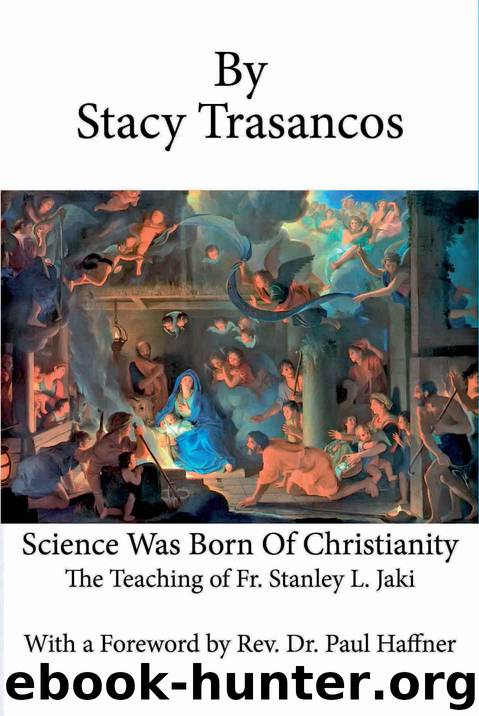Science Was Born of Christianity: The Teaching of Fr. Stanley L. Jaki by Stacy Trasancos

Author:Stacy Trasancos [Trasancos, Stacy]
Language: eng
Format: azw3
Published: 2013-12-05T05:00:00+00:00
I do not detract from God. Whatever this is, is from Him and through Him. But the realm of being is not a confused one, nor is it lacking in disposition which, so far as human knowledge can go, should be consulted. Only when reason totally fails, should the explanation of the matter be referred to God.[288]
The historian Alistair Cameron Crombie called this remark the point when the “medieval conception of nature began to cross the great watershed that divides the period when men looked to nature to provide illustrations for moralizing from that in which men began to study nature for its own sake.”[289] Consistent with Jaki’s thesis, this statement demonstrates the naturalism of the Christian mindset, a realistic naturalism necessary for the vitality of scientific progress. The historian David C. Lindberg also noted that this naturalism was one of the “salient features of twelfth-century natural philosophy” and was not limited to Adelard, but was also in more general treatises by scholars such as William of Conches, Honorius of Autun, Bernard Sylvester, and Clarembald of Arras, most of whom were also associated with schools in France.[290] There was a growing awareness of natural order and physical laws during the Middle Ages.
Jaki’s theological commentary on the psychology is interesting. There was an undeniable tendency toward all things miraculous in the Middle Ages as the scholars tried to incorporate the ancient Greek writings received and translated from the Muslim world. There was a fascination with the magical and astrological among the pantheistic, agnostic views found in those works. Viewing nature through the lens of Christian faith is not something that can be imposed, even if the state tried to impose it through unevangelical methods, as was done in the high Middle Ages. It is one thing to profess and practice a faith outwardly, but another thing altogether to give free assent of the intellect internally. This is why not all Christian scholars chose to view the cosmos through the faith expressed in the Creed, just as the Muslim scholars chose not to view the cosmos according to the Koran.
A person had essentially two options. To yield to a faith in a transcendental God as Creator was to yield to a belief in man’s freedom, but that came with tensions and dynamics that were intellectually difficult to deal with. The freedom of human intellect is hampered by the body, and knowledge is neither immediate nor complete on any subject. On the other hand, to acquiesce to a faith in a pantheistic nature-God only required a person to “seek repose” and be “carried effortlessly on the waves of nature’s events.”[291] Yet this careless repose in nature will ultimately lead to a fight for survival that begs the question about freedom anyway. What is man’s purpose and how do his surroundings work? This is why it was important during the medieval times, with the onrush of astrological treatises translated into Latin from Arabic, that the biblical account of creation played a “purifying role.” Those
Download
This site does not store any files on its server. We only index and link to content provided by other sites. Please contact the content providers to delete copyright contents if any and email us, we'll remove relevant links or contents immediately.
The Complete Stick Figure Physics Tutorials by Allen Sarah(7361)
Secrets of Antigravity Propulsion: Tesla, UFOs, and Classified Aerospace Technology by Ph.D. Paul A. Laviolette(5363)
Thing Explainer by Randall Munroe(3930)
The River of Consciousness by Oliver Sacks(3592)
The Order of Time by Carlo Rovelli(3182)
How To by Randall Munroe(3101)
A Brief History of Time by Stephen Hawking(3017)
I Live in the Future & Here's How It Works by Nick Bilton(2984)
What If?: Serious Scientific Answers to Absurd Hypothetical Questions by Randall Munroe(2694)
The Great Unknown by Marcus du Sautoy(2687)
Midnight in Chernobyl by Adam Higginbotham(2537)
Blockchain: Ultimate Step By Step Guide To Understanding Blockchain Technology, Bitcoin Creation, and the future of Money (Novice to Expert) by Keizer Söze(2481)
Networks: An Introduction by Newman Mark(2402)
The Meaning of it All by Richard Feynman(2341)
Easy Electronics by Charles Platt(2325)
The Tao of Physics by Fritjof Capra(2266)
Midnight in Chernobyl: The Untold Story of the World's Greatest Nuclear Disaster by Adam Higginbotham(2217)
Introducing Relativity by Bruce Bassett(2114)
When by Daniel H Pink(2112)
